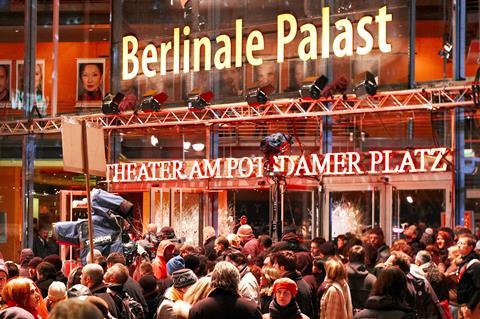
The Berlinale will write to German far-right party Alternative for Germany (Alternative fur Deutschland, AfD) amid an outcry after members were invited to the festival’s opening ceremony on February 15. By Sunday morning an open letter criticising the invitations had gone offline.
After the letter was signed by more than 200 film professionals from around the world, the festival issued a statement in which it said, “People – including elected representatives – who act contrary to democratic values are not welcome at the Berlinale.”
”We will express this clearly and emphatically in a personal letter to the AfD representatives as well as on other occasions.”
The Berlinale statement – signed by executive director Mariette Rissenbeek and posted to the festival’s Instagram and Facebook accounts – confirmed that AfD members have been invited to the opening ceremony as part of festival protocol to invite elected politicians.
The invited AfD members are Kristin Brinker, state chair of the Berlin AfD and a member of the Berlin house of Representatives, and Ronald Glaser, a member of Berlin’s regional parliament, who once described Winston Churchill, UK prime minister during the Second World War, as a “war criminal”.
“Both the Federal Government Commissioner for Culture and the Media and the Berlin Senate receive invitation quotas for the Berlinale opening, which are allocated to the elected members of all parties in the House of Representatives,” read Rissenbeek’s statement.
“It was against this background that the AfD representatives were invited to the Berlinale opening. The Berlinale stands for basic democratic values and against right-wing extremism and supports all demonstrations and other initiatives against the undemocratic currents.
“We clearly reject right-wing extremist or right-wing populist thinking and are concerned to observe that anti-Semitism, anti-Muslim resentment, hate speech and other anti-democratic attitudes are on the rise in Germany.”
The statement noted how, for several weeks, hundreds of thousands of people have been marching and protesting in Germany in defence of democracy and against the AfD. “The Berlinale joins these protests,” added the statement.
AfD is currently in second place in many voting opinion polls in Germany, with concerns the party could make gains in both local and European elections in the country later this year.
Letter down
The open letter criticising the invitations was launched on Friday (February 2) on the website openletter.earth; but was inaccessible as of Sunday morning. It is not clear whether it had been removed by those who originally posted it, by openletter.earth, or for another reason.
The letter had stated, “We, the undersigned, are outraged that invitations have been extended to politicians from the AfD to the opening ceremony of the 74th Berlin International Film Festival.
“We find this to be incompatible with the festival’s commitment to being a place of ‘empathy, awareness, and understanding,’ a declaration shared at its annual press conference on January 19 and published on the festival homepage.
“We don’t believe the opening ceremony can be considered a safe place for Jews, women, members of the BIPOC, LGBTI+, disabled, Roma and Sinti, or Jehovah’s Witness communities, who, among others, faced persecution and genocide at the hands of another far-right, national-conservative movement in Germany.”
The letter ended by asking the festival “to reconsider and rescind these offensive and insensitive invitations for the safety and well-being of all guests attending the festival”.
Signatories to the letter included filmmakers Saeed Taji Farouky, Sylvie Weber, and Christiane Schmidt, as well as industry professionals including Wouter Jansen from sales agency Square Eyes, and curator Dorota Lech from Toronto.
The controversy marks the latest right-wing involvement in the film world, after a right-wing writer was elected president of the Biennale, which runs the Venice Film Festival, and filmmakers in the Netherlands expressed concerns about the potential effect of a government led by right-wing election winner Geert Wilders in the coming funding round.

























No comments yet